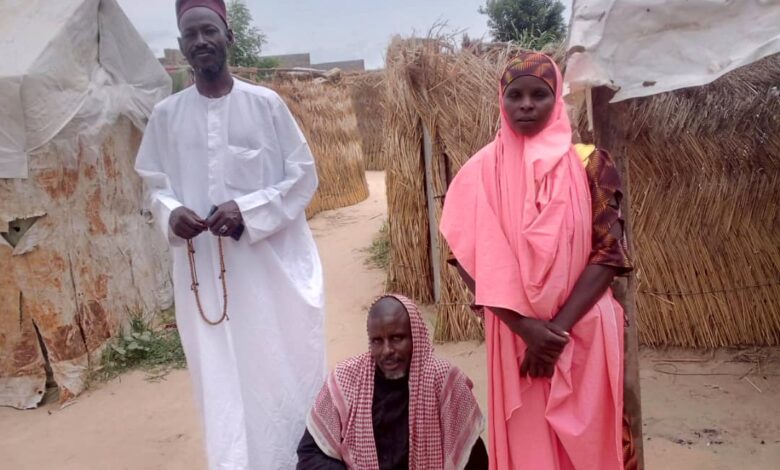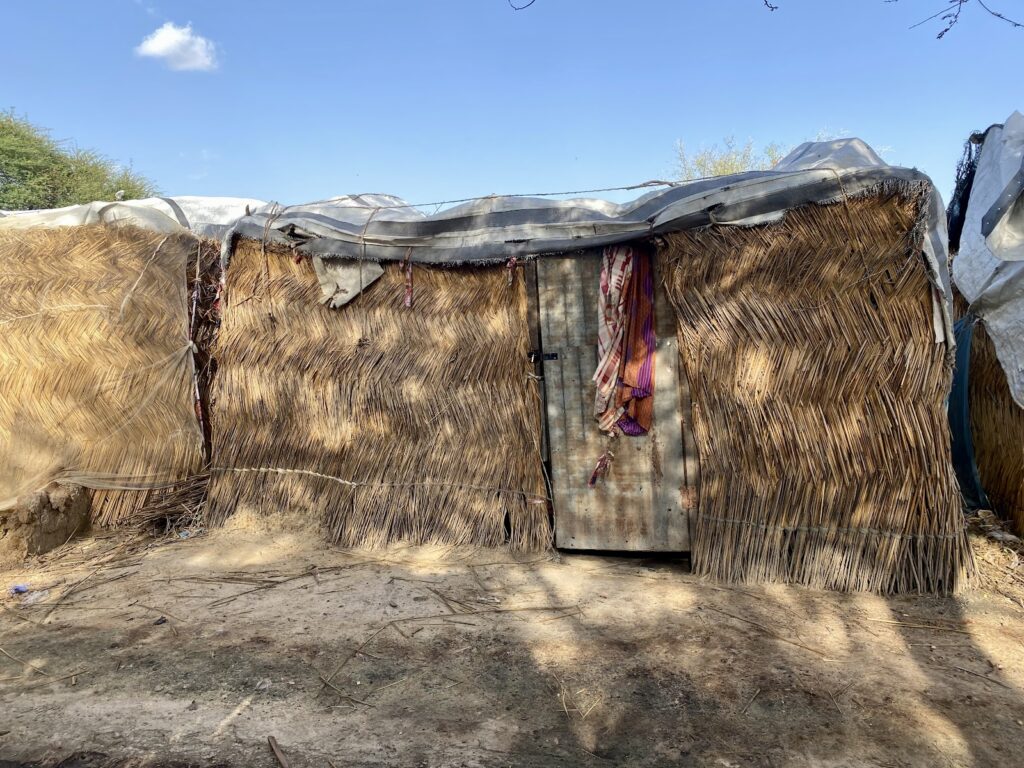Landowners Evict Unofficial Displaced People’s Camp In Nigeria’s Borno State
Five years after being forced from their homes by Boko Haram, a group of displaced herders in Nigeria’s northeastern state of Borno were given an eviction notice by the owner of the land they were staying. Their leaders say their future is uncertain.

Zanna Rebo Boderi is worried for his people.
He and his family are among thousands who have been ordered off the land they have been living on for four years, after they were displaced from their homes by the conflict in Borno, North East Nigeria.
“We found ourselves in a difficult situation. The owners of the land we are residing on have said we should leave their land in three months. Where do we go?”
Boderi, who is head of a large herderding community, said they settled at a makeshift camp called Shuwari Five IDP Camp on Baga road in Maiduguri, the state capital.
The large group of people made a camp that spread over several plots of land, each owned by different landowners. One by one, the landowners reclaimed their plots, reducing the size of the camp.
There are now a few plots occupied by the herders nearby, but they are crowded and overfilled with displaced people.
“There was nothing from the government to ameliorate our sufferings,” said Boderi.
They are running out of time to find alternatives. A month out of the original notice period of four months to vacate the land has already passed.
Seized
During the time that they have been at the location, they have tried to keep good relations with the landowners, they say, trying where they could to pay rent.
According to Boderi, two years into their ordeal they raised ₦100,000 to pay for one of the plots they moved to.
“We raised the money and paid for one year. The following year we could not raise it and the same land was seized by the owner,” he said.
The eviction has caused them fear and frustration; they don’t know where to go next.
The document obtained by HumAngle is signed by Alhaji Usman Koko, Zanna Rebo Boderi, and four witnesses from both sides.
“They are a herders community who fled their villages, in remote areas across the northern part of the state, because of violence by Boko Haram,” Boderi explained.
Some of those affected include Hafsatu Ibrahim, her husband and five children. “The village we left is not safe yet and this notice will affect us more, we don’t know where to stay because we don’t know anybody in the town,” she told HumAngle. “There is nothing we can do since we are told to leave. Let the public pity us with our children.”
There is also Haruna Ibrahim, 54, who arrived with his two wives and six children after the camp was established. He said: “Since our leader was issued a four month notice for us to pack our families and belongings in this place we have resided for four years, we have been worried and clueless about where to go,” he said.

He further explained “We have already exhausted one month out of the four months and yet we have no place that we could relocate to. We are living hopelessly and surrender everything to be determined by fate. How to get to a new place is the question that continues to bother us.”
When HumAngle contacted the owner of the land, Alhaji Usman Koko, he explained that the displaced community had overstayed on his land. He has a personal project to carry out on the property.
“Initially I allowed them to occupy the land for one year after they fled their villages. I noticed they were still in need of it and I decided to allow them to stay for some time. Eventually they stayed for four years, despite me wanting to develop the place for my personal project,” Koko said.
According to Koko, he had no choice but to push for legal action in order to take his land from the herder community. “I tried to collect my land several times over the years but the displaced people involved community stakeholders to beg me to extend their stay. This year, I have no choice but to involve myself in legal action to get back my land.”
Koko, Boderi, the leader of the herder community, and four witnesses signed an agreement last week of June 2023. The document stated that Alhaji Usman Koko had issued four months’ notice for the displaced community to leave his land.
They cannot return home
Boderi explained that the rural areas where the herders once dwelled with their cattle and sheep have been under constant threat of insurgents for the past six months. This was why they could not return.
“The place is characterised by abductions, killings and cattle rustling,” he said. At least 30 people were killed and uncountable cases of abductions carried out by terrorist groups operating in the region.
“Days ago, 21 herders were killed, some abducted, and hundreds of their cattle were rustled,” Boderi said while shedding tears.
The killing took place on July 26 at Linger village in Monguno Local Government Area (LGA) of Borno. “On the same day, they rustled three garke [a garke is equivalent to 100 cattle] and abducted some of the herders.”
Boderi further stressed that the number of cattle rustled is in the thousands.
In February HumAngle reported how terrorists released 11 people held captive for 21 days after their community paid a ransom. Those victims are members of the Boderi’s community.
“We don’t know how and where we can relate our problem to the government,” he continued. “We feel abandoned and in a helpless situation. We are calling on the government to intervene, our people are suffering. We have children and nowhere to go means more problems for us.”
Boderi added that the worst case scenario is that they would find their way around the city and get shelter in other host communities. “Perhaps before we get a solution,” he said.
HumAngle have gathered from local sources that the herders are planning to regroup and fight back insurgents who are making their lives a living hell in the remote areas where they dwell and feed their animals.
“We are angry and the government is not taking any measures to stop the killings, violence and theft our people are facing day by day. I swear, this has provoked the herders community all over the northern part of Borno and reprisal is turning out to be expedient,” a local source who preferred anonymity told HumAngle.
Elders and leaders of the community are disturbed and are at a loss on what to do, Boderi said.
“I receive calls and complaints every day. The recent killings of over 20 herders has stirred debates on whether the herders should leave the country or not. What can we do? Leave the country? But here is our home, we can’t just go. The herders community are frustrated,” he concluded.
Support Our Journalism
There are millions of ordinary people affected by conflict in Africa whose stories are missing in the mainstream media. HumAngle is determined to tell those challenging and under-reported stories, hoping that the people impacted by these conflicts will find the safety and security they deserve.
To ensure that we continue to provide public service coverage, we have a small favour to ask you. We want you to be part of our journalistic endeavour by contributing a token to us.
Your donation will further promote a robust, free, and independent media.
Donate HereStay Closer To The Stories That Matter




